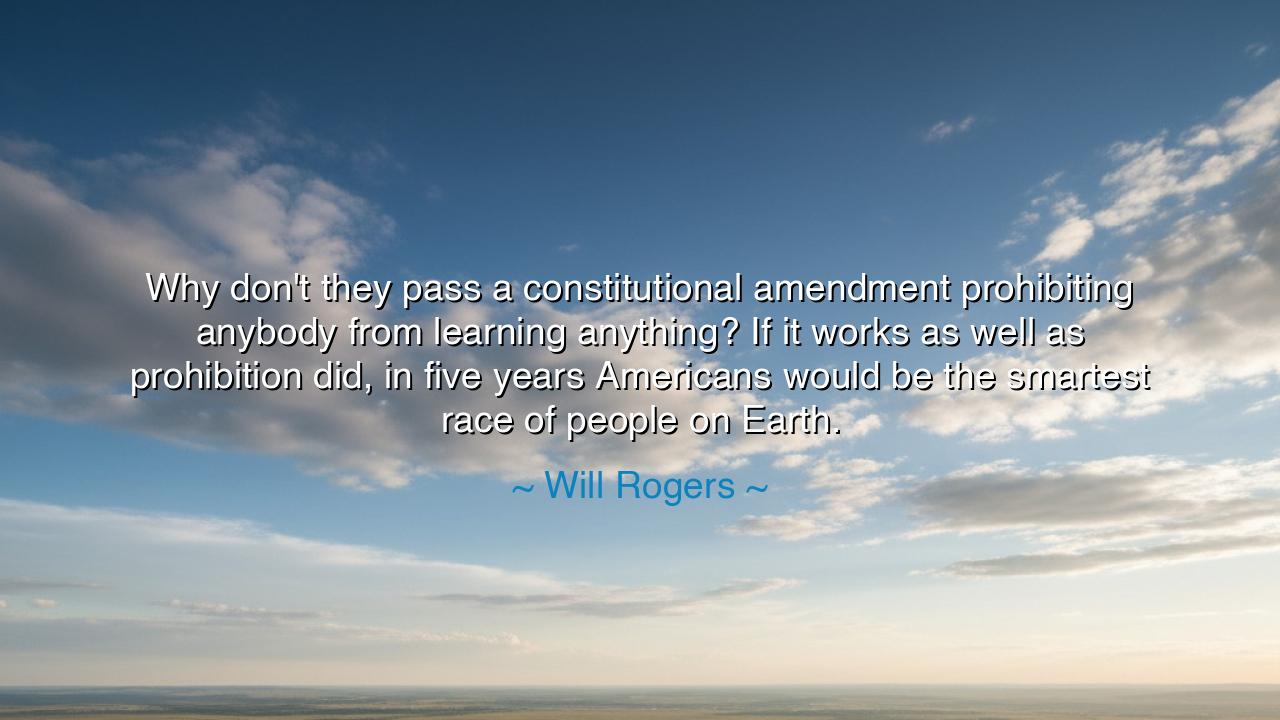
Why don't they pass a constitutional amendment prohibiting
Why don't they pass a constitutional amendment prohibiting anybody from learning anything? If it works as well as prohibition did, in five years Americans would be the smartest race of people on Earth.






“Why don’t they pass a constitutional amendment prohibiting anybody from learning anything? If it works as well as prohibition did, in five years Americans would be the smartest race of people on Earth.” — Will Rogers
In these sharp yet humorous words, Will Rogers, the beloved American humorist and philosopher of common sense, wields irony as a sword and laughter as a torch to illuminate a deep truth about human nature. On the surface, the line glitters with wit — a jest about the folly of Prohibition, that grand moral experiment which tried to ban alcohol and instead gave birth to bootleggers, speakeasies, and corruption. But beneath the laughter lies something more enduring: Rogers’ faith in the curiosity and contrariness of the human spirit. His jest reveals that the surest way to make people learn is to forbid it, for the human soul, when oppressed, rebels — and in rebellion, discovers its strength.
The origin of this quote lies in the 1920s and early 1930s, when America had banned the manufacture and sale of alcohol through the Eighteenth Amendment. This law, meant to uplift society, produced the opposite effect: it turned ordinary citizens into lawbreakers and gave rise to a golden age of organized crime. Will Rogers, a cowboy-turned-commentator with the wit of a sage, saw through the irony. To him, the experiment in prohibition revealed an eternal truth — that laws cannot extinguish desire, and that when freedom is denied, human beings find clever ways to reclaim it. In his jest about banning learning, Rogers mocks this contradiction — suggesting that if ignorance were made compulsory, the nation would soon become wise, for nothing awakens the mind like resistance.
The ancients knew this truth as well. The philosopher Socrates, condemned for corrupting the youth of Athens by teaching them to question authority, was proof that forbidding knowledge only strengthens it. His death did not silence philosophy; it ignited it. The more rulers sought to suppress inquiry, the more people hungered for it. Rogers, in his own age, echoed this ancient law of the human heart: forbidden truth becomes irresistible truth. The mind, when told not to think, begins to wonder; when told not to learn, it begins to seek; and when told to obey blindly, it begins to awaken. Thus, he saw that learning is not merely a process of education — it is an act of defiance, a declaration of the soul’s freedom.
Consider, too, the story of Galileo Galilei, who, centuries before Rogers, faced the wrath of the powerful for declaring that the Earth moves around the sun. The Church forbade him from teaching such ideas, branding them heresy. Yet their ban only immortalized his discovery. Knowledge, like light, cannot be confined; it seeps through the cracks of every prison built to contain it. In the end, Galileo’s truth triumphed — not because it was permitted, but because it was forbidden. Rogers’ jest about banning learning carries this same paradoxical wisdom: when knowledge is outlawed, the spirit of inquiry becomes revolutionary, and the human will to know becomes unstoppable.
Beneath his humor, Rogers offers a quiet critique of complacency. He mocks not learning itself, but society’s tendency to discourage it — to reward comfort over curiosity, obedience over thought. His imagined “amendment” banning learning is a mirror held up to the absurdity of any system that fears the educated mind. It is a warning that ignorance, when enshrined as virtue, leads to decay; but also a reminder that the human heart, when told to stay asleep, inevitably wakes. Rogers trusted in the natural intelligence of the common people — in their ability to see through hypocrisy, to laugh at folly, and to grow wiser by the very means that sought to suppress them.
In this way, Rogers’ humor becomes a weapon of wisdom. He uses irony to teach the same lesson the sages taught through parable: that knowledge cannot be legislated, and curiosity cannot be outlawed. When the powerful attempt to control thought or limit learning, they sow the seeds of their own defeat. For the mind, once stirred by curiosity, becomes like water flowing downhill — unstoppable, finding its own path no matter how many barriers are built against it. Rogers reminds us that freedom and learning are inseparable, and that a society that cherishes one must protect the other with equal devotion.
So, dear listener, take this jest not as laughter alone, but as counsel for the ages. Never wait for permission to learn, for learning is the birthright of every free soul. Seek truth even when others mock it; question even when others demand silence. If ignorance becomes law, let your mind become rebellion. For as Will Rogers teaches with a smile, no decree can extinguish the light of curiosity — and if the world were foolish enough to ban learning, that very ban would kindle a fire of genius across the land. The wise laugh with him, knowing that what begins in humor ends in truth: the more the world forbids knowledge, the more fiercely the human spirit will rise to claim it.






AAdministratorAdministrator
Welcome, honored guests. Please leave a comment, we will respond soon